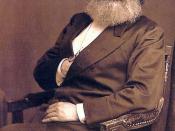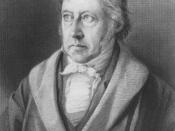The Early and Later Writings of Karl Marx
Classical Marxism has had an influence in a number of areas. One may first think of economics, but Karl Marx's theories have also affected ideas about history, society, ideology, culture, and politics, just to name a few. From his early writings in liberal newspapers to his later ones such as Capital, Marx remained true to his revolutionary ideas and Communist thinking. As most writers, his style may have changed as well as some of the vocabulary he used to express his ideas, but he did not change his basic concepts and principles. There was a shift in Marx's thinking from philosophical to more scientific during his career, but essentially, Marx's theories remained intact.
Karl Marx was born in Prussia in 1818. His family was considered middle-class and his father was a lawyer. In 1841 he received his Doctorate in Philosophy from the University of Berlin.
After graduating, he began writing for the liberal-radical newspaper Die Rheinische Zeitung, but the government eventually shut the paper down due to its radical views. In 1843 Marx married Jenny von Westphalen and was soon forced to leave Germany. The couple settled in Paris where Marx soon met Friedrich Engles. This meeting was incredibly important, and began a lifelong friendship and collaboration of writings. 1845 saw Marx expelled from France, so he moved to Brussels and became associated with the Communist League. It was at this time that he and Engles were asked to write the Manifesto of the Communist Party. In 1849 Marx moved to London where he began backing away from his revolutionary activity and focused on researching the Capitalist system. During this time Marx lived in poverty while writing three volumes of Capital and was supported mostly by Engles. Marx once again became...


